The connection between inflammation and malignancy has long been recognized in gastric and esophageal cancers. Given the considerable success of immune checkpoint inhibitors in other tumor types, for example, lung cancer and melanoma, much attention is being paid to furthering their role in gastric and esophageal cancers. The Cancer Genome Atlas has provided further details of the molecular heterogeneity of these tumors, which may help predict responsiveness to immune checkpoint inhibitors. This article discusses the rationale for investigating these agents in gastroesophageal cancer and summarizes the relevant clinical trial data and ongoing studies.
Key points
- •
The connection between inflammation and malignancy has long been recognized in gastric and esophageal cancers.
- •
Given the considerable success of immune checkpoint inhibitors in other tumor types (eg, lung cancer and melanoma), much attention is being paid to furthering their role in gastric and esophageal cancers.
- •
The Cancer Genome Atlas has provided further details of the molecular heterogeneity of these tumors, which may help predict responsiveness to immune checkpoint inhibitors.
- •
This article discusses the rationale for investigating these agents in gastroesophageal (GE) cancer and summarizes the relevant clinical trial data and ongoing studies.
Stay updated, free articles. Join our Telegram channel

Full access? Get Clinical Tree





